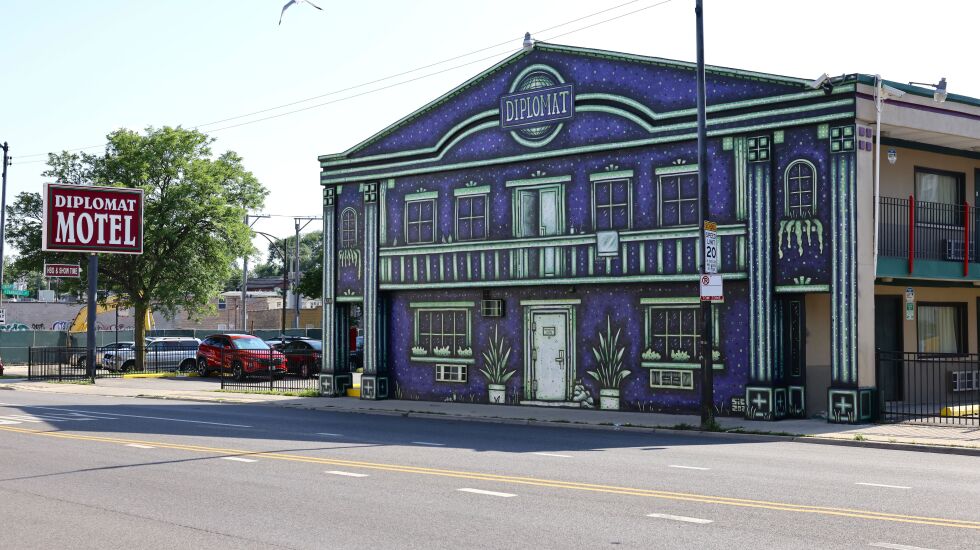
A Lincoln Avenue motel once known as a hot-pillow haven and targeted for demolition will be turned into “stabilization housing” for people with mental health and substance abuse issues, thanks to a plan to combat homelessness that could become a model for all 50 wards.
On Monday, the City Council’s Committee on Housing and Real Estate gave Mayor Brandon Johnson the go-ahead to acquire the Diplomat Motel, 5230 N. Lincoln Ave., for $2.9 million and turn its 40 rooms into supportive housing with a host of wrap-around service on site.
The plan is aimed at duplicating the nurturing, hotel-to-housing model that worked so well during the pandemic.
In March 2020, the Hotel Julian, 168 N. Michigan Ave., was one of four Chicago hotels owned by Oxford Capital Group that agreed to rent rooms to isolate patients who tested positive for COVID-19 or had been exposed to someone who tested positive. Besides joining a network of hotel rooms that eased the strain on overburdened hospitals, those hotels also helped single men with chronic health conditions make the transition to permanent housing, instead of cycling in and out of emergency rooms or jails.
That’s the model the Johnson administration wants to duplicate by acquiring the Diplomat, according to Matt Richards, deputy commissioner for behavioral health for the Department of Public Health. He projected the annual length of stay at three to six months.
“The stabilization housing pilot is intended, really, for folks that are cycling across our 911 system. Public safety services, homeless services and emergency departments in your wards. Typically, very high-need residents,” Richards told the housing committee.
“They can have their own housing unit in this project, with on-site primary care, psychiatry, substance use treatment, case management services, etc,” he said.
Many who stand to benefit from the nurturing, hotel-to-housing model “tend to get episodic care” now, Richards said.
“They’re at one emergency department one day. There’s a 911 call. There’s a different emergency department. But a team of people never get to really know that person — who they feel safe with, that they’ve developed trust with, that are able to deliver services, that are culturally responsive, linguistically responsive. That is the expectation of these service providers,” Richards said.
Those providers will be chosen after a request for proposals is issued, he said.
The 40 rooms fall far short of handling the hundreds of people who need supportive housing. Richards said the city will use a “data-driven approach to generate a list of people who meet the criteria,” then identify “community-based referral sites” to help find those individuals.
“We believe there’s 1,200 people that could benefit from this intervention, maybe more. So, the intention is not for this one pilot project. Our goal is to get to a few hundred people where we can try to make the case that it works,” Richards said. After that, “the next step would be to think about, how do you scale it?”
Ald. Andre Vasquez (40th) whose ward includes the Diplomat Motel in Lincoln Square, is already encouraging his colleagues to identify hotel sites in their wards.
“When you look at Chicago’s housing infrastructure, at best it can address the issues for 3,100 individuals. That’s not enough for the current existing unhoused population,” Vasquez said. And the immigrant situation “makes it even more untenable,” he said.
“Having a system where each person who is unhoused has the dignity of their own unit, the dignity of their own support system — that somebody is able to walk with them through their journey from where they currently are to finding housing in the long term — we can set a model that the rest of the city can adopt,” he said. “That creates what is, in effect, bridge housing, taking people from being unhoused to finding jobs.”
Too often, the only alternative for somebody living in a park, or in a tent beneath a viaduct, is “miles upon miles upon miles away from the neighborhood” they’re in, “so they won’t accept help,” Vasquez said.
With a smaller approach, like the Diplomat, “you can do satellite ones where, potentially, you could have one in each ward,” he added.
The Diplomat is along a stretch of Foster Avenue that served as primary route between Chicago, the north suburbs and Wisconsin before the Edens and Kennedy expressways opened.
Retired Ald. Pat O’Connor (40th) at one point had tried to get all of the motels demolished, calling them havens for prostitution.







